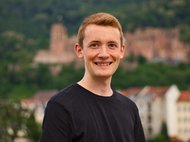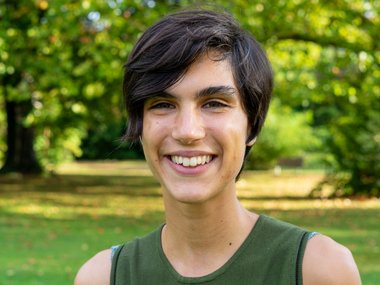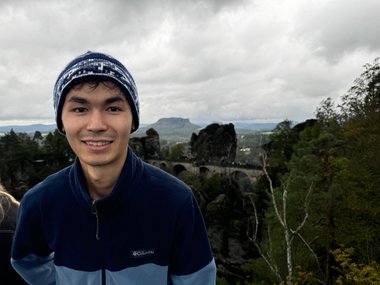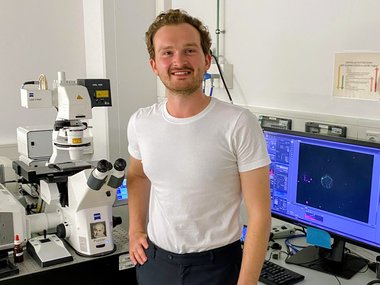Master Program - 1st Phase of the Integrated PhD Program
Exploring interdisciplinary boundaries
In the 2-year Master's phase, modules and courses are curated to give you a comprehensive understanding of the topic of Matter to Life (MtL). Apart from a solid foundation in the key scientific disciplines of physics, chemistry and biology, you will also learn a common scientific language through the joint courses, a key skill indispensable for interdisciplinary research.
The Matter to Life program brings together students with different study backgrounds from all around the world, thus encouraging peer to peer learning. You will be taught and trained by experts in the respective fields, and will access to state of the art laboratories and facilities, ensuring you receive an outstanding and well rounded education. To ensure that you can devote yourself fully to your research, we support you with a stipend during this phase.
Who are we looking for?
We are looking for highly motivated students with a Bachelor or a comparable undergraduate degree in chemistry, physics, biochemistry, biophysics, biotechnology, materials science, engineering or related subjects, who are interested in an interdisciplinary curriculum. The program is entirely taught in English and we welcome international students. Small cohort sizes enable strong scientific and cultural exchange and will give you the chance to not only interrogate scientific questions from the perspectives of various disciplines, but from different cultural contexts as well. The application phase is usually from September – December, one year prior to the start of winter study semester.
Find all detailed information about your application on our application page.
The program starts with a welcome course
The program will commence with a welcome course in September, spanning several weeks, wherein you will be introduced to your cohort and fellow students. You will participate in a range of courses, talks, and workshops designed to enhance both your scientific and soft skills. These activities are carefully crafted to give you a comprehensive understanding and equip you with the tools to excel in your Master's course studies.
Read more about our welcome course here.
Different foci at our teaching universities
Degree focus at University of Göttingen: Complex Systems and Biological Physics
The MtL program at University of Göttingen focuses on the field of Complex Systems and Biological Physics. PhD candidates will learn theoretical concepts and experimental tools that can be used to quantitatively study biological systems. They will also investigate the physical and chemical principles that can either modulate the emergence of life or life-like behaviors from inanimate matter.
Including but not restricted to:
- Soft Matter Physics
- Active Matter
- Statistical Biophysics
- Theoretical Biophysics
- Biomolecular Physics and Simulations
- Micro- and Nanofluidics
- Theoretical and Computational Biophysics
Degree focus at Heidelberg University: Molecular Systems Chemistry and Engineering
The MtL program at Heidelberg University focuses on the field of Molecular Systems Chemistry and Engineering and aims to overcome the traditional boundaries that exist between disciplines. It addresses the roots of biological processes in the context of chemistry and physics, thus forming the basis for the understanding of life, as well as providing the means to engineer life-like processes.
Including but not restricted to:
- Macromolecular Structures and Functions
- Chemical Biology
- Bioconjugation & Imaging Chemistry
- Genome Engineering
- Synthetic Cells & Virology
- GlycoSciences
- Biofabrication and Tissue Engineering
- Data Science and Simulations
Since we established the joint degree, flexibility has increased and PhD candidates can choose courses from either university. You can choose your study site based on your background and interest.
In the 1st term you share all lectures with your fellow students from both universities. This is dedicated to learning the basic subjects required for you to learn and conduct research in this field.
Shared core courses
- Introduction to Physics of Complex Systems
- Quantitative Analysis of the Chemistry of Life
- Bioengineering/Synthetic Biology
- Biophysics and Physical Chemistry of Life
- Ethics in Synthetic Biology
- Professional Skills in Science
You will learn to appreciate that tackling a problem from different perspectives can give you invaluable information and help you devise novel approaches to solve complex issues situated at the interface of chemistry, biology and physics.
You can select and choose topics from the module handbook from our faculty that you find intriguing or maybe even challenging. The second semester gives you the freedom to shape the curriculum that fits your aptitude and interests.
It is all about learning by doing! The second year of your Master's will be dedicated to practical work - in the lab or in front of a computer at one or more of our Faculty's laboratories and research groups. To bring interdisciplinarity truly into practice, the first half of the year covers lab rotations, wherein you will be doing a project across two different groups. Semester IV is when you get an opportunity to carry supervised research on a topic as part of your Master thesis.
Overall, the program is heavily research-oriented and encourages students to think and learn autonomously. The combination of theory in the first year and practical experience in the second year ensures that you are prepared to take on the challenge of the doctoral thesis.
Support Guidance, and Networking
A Buddy program with students from the older cohorts will help with your arrival in Germany, establish a social circle, and overall ensure a smooth start.
Our mentoring program with the Faculty Fellows will further help you explore different scientific avenues during your studies, and assist you in career development. It will promote the mentees to interrogate their future career within the scientific field, explore opportunities and pathways to achieve the set goals in this context.
Apart from the course work and lectures, students are expected to participate in biannual MtL Days, annual Max Planck School Days (with students from other Max Planck Schools), and student-organized retreats. These are excellent platforms for them to connect with faculty and fellow students, and to get familiar with the MtL community - the people and their science.
Participation in an international conference/summer school/symposium is also supported financially during your Master's phase.
These measures organized and supported by the program enable our students to establish and expand their scientific network early on in their research careers.
Upon successful completion of this phase, students receive a Master's degree in Matter to Life from both University of Göttigen and Heidelberg University. Students can then move onto the 2nd phase, wherein they will continue the last three years of the program carrying out their PhD studies with any of the MtL faculty members within the network.
Hands-on research: Stories from our PhD candidates during their Master’s
Exemplary Study Plan
|
1 st Semester
|
2 nd Semester
|
3 rd Semester
|
4 th Semester
|
|---|---|---|---|
| Introduction to Physics of Complex Systems Quantitative Analysis of the Chemistry of Life Bioengineering/Synthetic Biology Biophysics and Physical Chemistry of Life |
Specialization in Matter to Life: Molecular Systems Chemistry and Engineering or Complex Systems and Biological Physics |
Lab Rotations: 2 projects in different groups/labs |
Master Thesis |
| Ethics in Synthetic Biology Professional Skills in Science |
Choice of advanced subject related courses | ||
|
31 Credit Points
|
29 Credit Points
|
30 Credit Points
|
30 Credit Points
|



